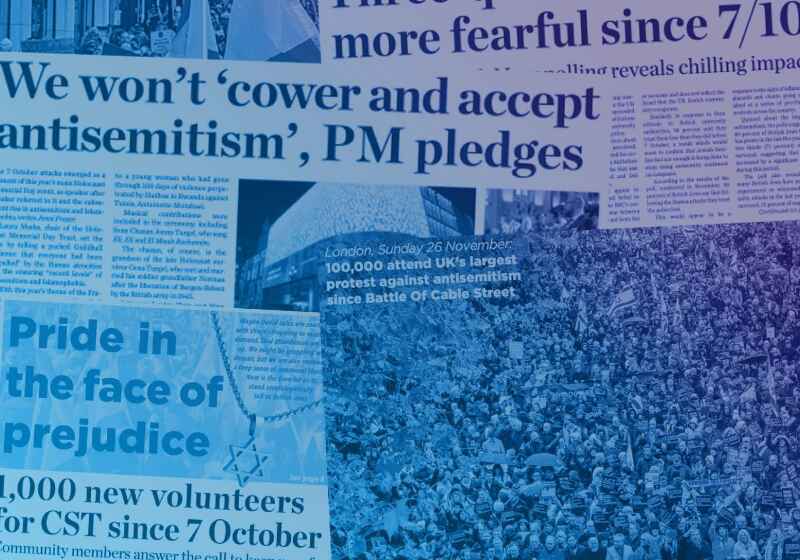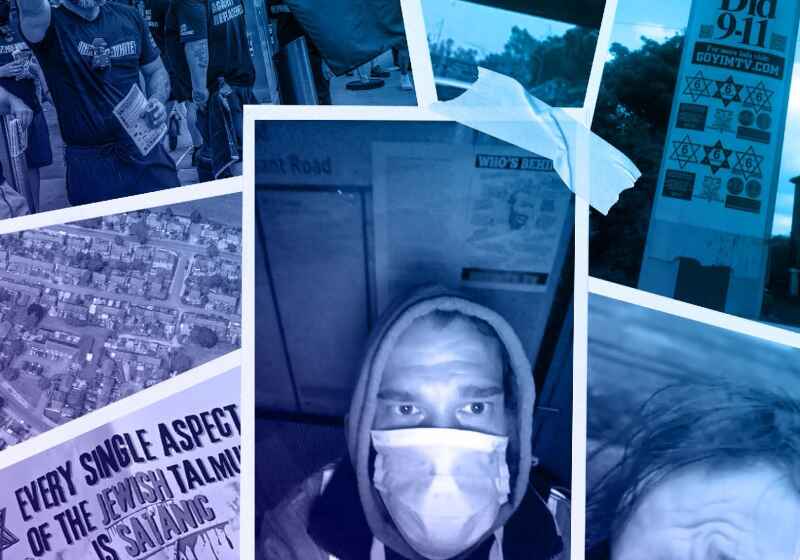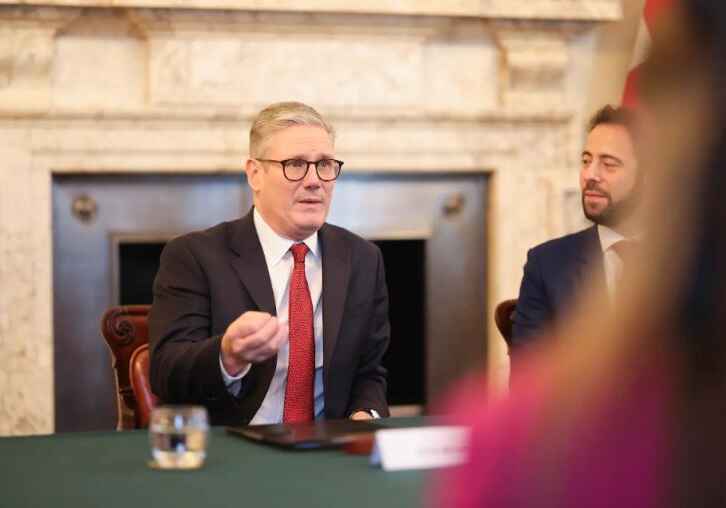CST Blog
Political Soldiers and the New Man - part two
27 April 2010
Read part one of this series of blogs here
The National Front's public admiration for the Iranian Revolution and their financial connection with Libya were not universally popular amongst NF members. Even within the leadership group there were some who were unhappy about these Middle Eastern links, and about the strong influence exerted in the running of the NF by Roberto Fiore and the other Italian exiles in London. This led to a purge in 1986: Ian Anderson, Martin Wingfield, Andrew Brons and others were pushed out of the party, leaving it in the hands of Nick Griffin, Patrick Harrington, Derek Holland and Graham Williamson, all of whom were fully committed to the Political Soldier model.
After this second purge, the NF started to shed the last vestiges of an old-style, British nationalist approach and adopted an increasingly hardline revolutionary, Third Positionist mindset. This led them to all manner of activities that people did not expect from the NF. In May 1986, print workers manning the picket lines outside the News International plant in Wapping were shocked to find NF members standing alongside them. "We have gone down on the picket line to support the workers", Holland told the East London Advertiser, "because we think they have a just case against a capitalist like Rupert Murdoch." The NF's politics became increasingly dominated by talk of community action, self-reliance, racial segregation, national self-determination and a deep hatred of capitalist elites, which were often seen as synonymous with Zionism.
In September 1987, the NF took a symbolic step which, perhaps more than any other, showed that they were serious about their new direction: they removed the Union Jack from the masthead of National Front News. They explained the decision in a statement titled "Nationalism not Imperialism":
The National Front accepts that many people in Britain are deeply stirred by the history and traditions associated with the Union Jack. We too are proud of many of the deeds of daring and heroism done by our forebears under that flag, but we also believe that its connections with City of London imperialism and the suppression of true nationalism from Cymru to Egypt, and from Eire to Australia, make it totally unsuitable as the banner of the National Revolutionary Movement.
It has therefore been replaced on our front page by the far older flags of the nations to which, if we go back to our roots as nationalists must, our peoples owe their allegiance. We do not believe that there is such a thing as 'the British nation'. Britain is a Family of Nations. Accordingly, we display with pride the banners of England, Scotland, Cymru and the future flag of Ulster.
Spearhead, the magazine of John Tyndall's rival British National Party, described this as "just one more stage in the transition of the National Front from a full-blooded British nationalist movement, as it was in its heyday of the 1970s, to a party that shares much more in common with the radical left than it does with nationalism in this country." The article was titled "The Reddening of the National Front".
Spearhead had it wrong: the NF's new direction was more green than red. Colonel Gaddafi's writings about democracy in the Green Book were much more influential than any left wing thought, which remained anathema to the NF. Inside National Front News at that time, articles titled "Zionism = Nazism" and features "examining the role of capitalist and Zionist media bosses" sat alongside adverts for the Green Book, Ayatollah Khomeini's Islam and Revolution and David Irving's Churchill's War. The writings of Gaddafi and Khomeini became set texts for NF political training seminars. In March 1988, the front page of National Front News proclaimed "The New Alliance", incorporating "White and Black racial separatists" and "Third Way nations such as Libya and Iran": "It may be years before really close, practical, relationships are established between us, but Third Way principles are spreading everywhere".

This alliance was most apparent in the convergence of political rhetoric. In January and February 1987, National Front News featured an article in several parts which described the "New Man" who would stand at the heart of the "Spiritual Revolution" they were trying to create. Religion and spiritual rebirth were a crucial feature of their programme:
The importance of the New Man, of spiritual struggle, cannot be overestimated. The New Man is the builder of our New World - if he does not come into being where is our Revolution? And this New Man is you, the reader, for such men and women have to be moulded from the materials at hand, no matter how imperfect.
And what are the failings and weaknesses that this New Man is meant to replace?
This New Man is qualitatively different from the type of man generated by the present System. The System is materialist, thus it produces 'materialist man': the man who doesn't concern himself with the interests of others; the man whose whole life is dominated by consumer goods; the man whose selfishness, greed and pettiness kills the virtues of Honour, Honesty and the Common Good. Such a man cannot save a nation from decadence, for he is the product of decadence. The air may choke with poisonous fumes, the unborn child may be aborted, the country may stand betrayed - the degenerate cannot fight back, he can only pull others down with him.
It may be coincidence, but an editorial published a year later in the English-language Iranian pro-regime newspaper Kayhan International, titled "The Birth of a 'New Man'", used remarkably similar language to describe the central achievement of the Iranian Revolution:
...the greatest achievement of the revolution yet, is giving birth to a 'new man'. A new man who has disrupted the present balance of the contemporary world and has become a model for all the oppressed and deprived people of the world in their struggle against any element of oppression and tyranny.
[...]
The new man experiences a third way which is free living in the shadow of a revolutionary religion, with trust and reliance on Allah. He shares this delightful experience with other oppressed and deprived nations. The new man does not believe the equations of tyranny and oppression, and is not intimidated by the sophisticated technology, nuclear weapons, or the massive propaganda of the imperialist mass media.
The Political Soldiers counted themselves amongst the "oppressed and deprived people of the world", struggling against the "oppression and tyranny" of Capitalism and Marxism; behind both of which stood, in their conspiratorial mindset, global Zionism.
In addition to their new political language, the NF did try to build "close, practical, relationships" with black, Arab and Muslim groups, with varying degrees of success. In April 1988, leaflets for a new group, the Campaign for Palestinian Rights (CPR), appeared as an insert in Nationalism Today. Called "Terror Tours", their immediate target was the Association of British Travel Agents (ABTA) which was due to hold its annual conference in Jerusalem that year. NF members picketed travel agents in London, Nottingham, Blackpool, Shrewsbury, Preston, Burnley and Leeds. The Palestine Solidarity Campaign and the PLO office in London, horrified at the thought of far right infiltration of their campaigns, both issued public statements identifying CPR as an NF front and warning Palestinians and their supporters not to have anything to do with it.
In May, an NF group including Harrington and Williamson went on the annual pro-Iranian Quds Day march in London, where they handed out their "Terror Tours" leaflets and chatted to the organisers. In Leeds, as Searchlight magazine reported, "anti-fascists were shocked to see a local young black man selling a pro-Khomeini paper alongside the NF street sellers and exchanging publications with them."
Their efforts to build links with black separatists focused on groups which had little presence in the UK. In February 1988, National Front News featured an interview with an American black separatist called Osiris Akkebala, of the Pan-African Inter-National Movement (PAIN). "Top Blacks Back NF Plan" ran the front page headline, above a photograph of Akkebala and an NF member reading a copy of the newspaper. "White Nationalists and Black Separatists should co-operate in our common struggle against multi-racist tyranny", read the article underneath. Nick Griffin's relationship with Akkebala proved to be an enduring one. Ten years later, when Griffin stood trial on race hate charges for the racist magazine The Rune, Akkebala flew in from America to testify in his defence. Griffin cited Akkebala's 1988 interview as 'proof' that his views were not racist, but it did not stop the jury from convicting Griffin of inciting racial hatred.
In what has become one of the more well-known episodes in Nick Griffin's political career, in September 1988 Griffin, Holland and Harrington visited Libya to try to get funding for the National Front. As this short clip from a 1999 BBC documentary explains, all they got were more copies of the Green Book:
Phil Andrews, an NF activist in Isleworth, donated a copy of the Green Book to his local library, but library records later showed that it was never checked out by any readers. Inside and outside the NF, there was little support for their increasingly bizarre political ideas.
In the third and final part of this series, read how Third Positionists ended up visiting Baghdad and praising Hamas.
Read More
CST meeting with Prime Minister Keir Starmer
2 December 2024

Antisemitic Discourse in Britain 2023
28 October 2024

Pathway to Terror
21 October 2024
